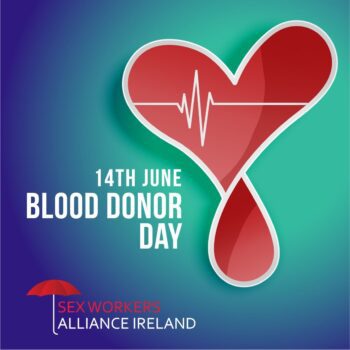 by Adeline Berry
by Adeline Berry
The world appears to be in turmoil and many of us are looking for ways to be part of the progress in making things better. In that spirit I recently emailed the blood donation service in Ireland to ask about their restrictions on donating. I must confess that it’s been a while since I last donated, the last time having been in the US some years ago. The biggest reason I hadn’t donated, besides just being a busy single parent, was that I had gotten tattooed regularly. In Ireland, the waiting period to donate blood after getting tattooed is four months. For many years I supported myself and my family through tattooing, and an occupational hazard associated with working as a tattooer is getting tattooed oneself. I am also a sex worker and have engaged in sex work since my teenage years in one form or another. The reason for my email enquiry was to find out how long I would have to wait since my last sex work appointment before donating. Because of Coronavirus and COVID-19 it has been a few months since most sex workers in Ireland have had physical contact with clients. A day after emailing my enquiry I received a response. I am banned from donating blood indefinitely. This was surprising to me. I of course fully support reasonable precautions designed to protect us all, but I can’t help wondering how reasonable these precautions are. I am not a haematologist of course, but I do know we live in a complex world where sometimes precautions that are purported to help can also be designed to cause harm. An example of this would be Irish laws relating to sex work which were promised to benefit sex workers but have instead resulted in a ninety-two percent increase in violence and evictions, jailings and deportations for the very population these laws were purported to help. These laws were fought for by non-governmental organisations purportedly founded with the idea of helping the vulnerable. The organisations that lead the charge however were founded by religious orders, or were themselves religious orders, whose histories are steeped in human rights abuses designed to control the Irish working class population by rounding up and imprisoning Irish women that fell outside of polite society’s notions of what constituted an acceptable woman: impoverished sex workers and single mothers.
So why is there a lifetime ban on sex workers donating blood? As a client, you are asked to wait twelve months before donating after having engaged in sex with a sex worker. Similarly, you are asked to wait twelve months before donating if you are a cisgender man who has had sex with another man even if a condom was worn. This is effectively a lifetime ban on monogamous cisgender gay couples from donating as long as they are sexually active. So, what about cisgender heterosexuals? Why is there a presumption that heterosexuals are more likely to be sexually monogamous than gay men? To say that we in Ireland have been provided with substandard sex education for all would be an understatement. My experience of formal sex education was being taught the very basics of human reproduction during religious studies in my teenage years. Outside the classroom my informal sex education is ongoing. From my perspective as a sex worker who is constantly in communication with other sex workers, it is quite common to encounter Irish clients both young and old that do not understand the importance of wearing condoms during sex. Rather than empower sex workers as recent changes to Irish laws and policing were purported to do, sex workers have instead been made more vulnerable. Though street work in Ireland has been legalised, heavy Gardaí presence, intimidation by Gardaí and continuing arrests have reduced bargaining and negotiation time for sex workers and time to decide whether a vehicle is safe before stepping into it. Undocumented workers are afraid to carry contraception for fear of having them in their possession used against them by Gardaí as proof of engagement in sex work. Clients have been emboldened by sex workers’ increased vulnerability, demanding unprotected sex and lower rates from workers with threats of bad reviews and refusal to continue seeing them as clients. I have spoken to numerous migrant sex workers that have told me about their frustrating attempts to educate Irish clients regarding the use of condoms. So, are we then to simply assume and accept that Irish cisgender clients are using condoms with their partners and spouses if they are that adamant about refusing to use them while having sex with a stranger? Are we to simply accept and assume that cisgender, heterosexual, Irish men and women are being open and honest with their partners and spouses regarding their various infidelities and excursions to visit sex workers? Do current blood donation restrictions account for cisgender Irish men that identify as heterosexual while continuing to secretly engage in sex with other men? Stigma in Ireland still keeps many married heterosexual, heterosexual-identifying and bisexual men closeted and secretive with regards to their sexual encounters with other men, transgender women.
When I emailed the blood donation service, I didn’t disclose what type of sex work I engaged in and nor was I asked. What if it had been camming? Or phone sex? Sex work encompasses many forms, from in person sex to pornography. The form of sex work I have been engaged in for the past several years, domination, has not involved me receiving the body fluids of someone else or transmitting mine to them. What if it was simply a cuddling service that I provided, where the client and I lay fully clothed in a bed just holding each other while we nap for a while? In Ireland, paying for sex work is defined as
“Payment etc. for sexual activity with prostitute: 7A. (1) A person who pays, gives, offers or promises to pay or give a person (including a prostitute) money or any other form of renumeration or consideration for the purpose of engaging in sexual activity with a prostitute” while sexual activity is defined as “any activity where a reasonable person would consider that (a) whatever its circumstances or the purpose of any person in relation to it, the activity is because of its nature sexual, or (b) because of its nature the activity may be sexual and because of its circumstances or the purposes of any person in relation to it (or both) the activity is sexual” (Criminal Law, 2017).
There’s that word reasonable again. In Ireland all manner of activities have been deemed sexual by people we have assumed to be reasonable, from jazz dancing and attending the cinema to driving in a car (Luddy, 2007). “Reasonable” Irish men and women fought for recent harmful changes to Irish sex work law. “Reasonable” Irish men and women in the Gardaí Síochána regularly evict sex working women, including single mothers, from their homes and imprison young women, including ones that are pregnant, simply for working together for safety. I am friends with a married couple that do cam work together. This mostly involves them having sex with each other in front of a camera. To the best of my knowledge they are completely monogamous and faithful to each other. Is it right that they be banned from donating blood for life simply because they pay their rent through camming? I myself am in a monogamous relationship. My spouse is also a sex worker. Neither of us receive bodily fluids from anyone outside of our marriage during sex either through work or outside of work.
Reasonable precautions protect us all, but can restrictions on blood donation by sex workers be considered reasonable? Or are they designed, intentionally or otherwise, to further the long, continuing, persecutory history of stigma against us? If the purpose of these precautions is to decrease risk of infecting the blood supply and not to stigmatise segments of the population, then blanket bans on sex workers need to be lifted and then considered on a case by case basis.
References
Criminal Law (Sexual Offences) 2017, Retrieved from http://www.irishstatutebook.ie/eli/2017/act/2/section/25/enacted/en/html
Luddy, M. (2007). Prostitution and Irish society, 1800-1940. Cambridge University Press.
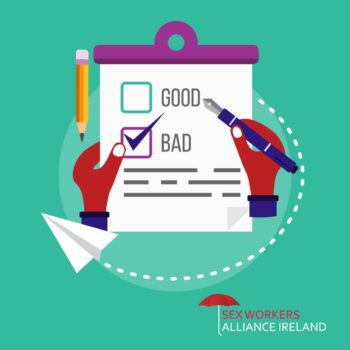

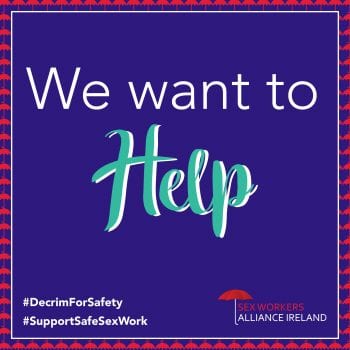
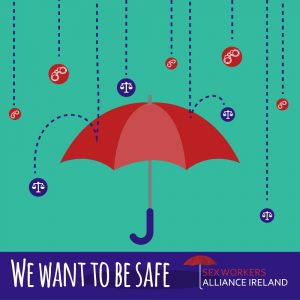 “When sex workers work together with Gardaí we can make society better,” says Kate McGrew, current sex worker and director of the Sex Workers Alliance Ireland (SWAI) commenting on two court cases involving attacks on sex workers which were reported on today.
“When sex workers work together with Gardaí we can make society better,” says Kate McGrew, current sex worker and director of the Sex Workers Alliance Ireland (SWAI) commenting on two court cases involving attacks on sex workers which were reported on today. by Adeline Berry
by Adeline Berry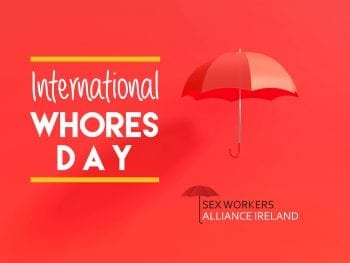 “Today is International Sex Workers Day and we are marking it while slowly emerging from the throes of a global pandemic”, says Kate McGrew, current sex worker and director of the Sex Workers Alliance Ireland (SWAI).
“Today is International Sex Workers Day and we are marking it while slowly emerging from the throes of a global pandemic”, says Kate McGrew, current sex worker and director of the Sex Workers Alliance Ireland (SWAI).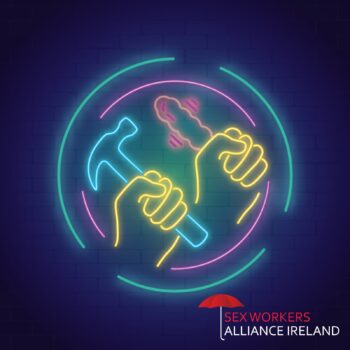
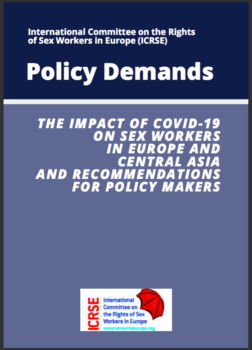

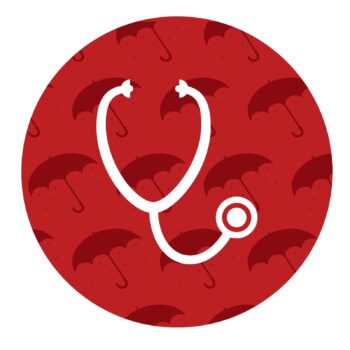 Kate McGrew current sex worker, director of The Sex Workers Alliance Ireland (SWAI) and co-convenor of the European Network for Sex Workers’ Rights (ICRSE) is calling for the Irish government to urgently act to ensure that sex workers, along with their families and communities, can access social protections during the COVID-19 pandemic. She says “As more countries impose lockdowns, self-isolation and travel restrictions many sex workers will lose most, or all, of their income and face financial hardship, increased vulnerability, destitution or homelessness. The clandestine nature of sex work also means that many will be unable to access the safeguards provided for other workers, such as sick pay.”
Kate McGrew current sex worker, director of The Sex Workers Alliance Ireland (SWAI) and co-convenor of the European Network for Sex Workers’ Rights (ICRSE) is calling for the Irish government to urgently act to ensure that sex workers, along with their families and communities, can access social protections during the COVID-19 pandemic. She says “As more countries impose lockdowns, self-isolation and travel restrictions many sex workers will lose most, or all, of their income and face financial hardship, increased vulnerability, destitution or homelessness. The clandestine nature of sex work also means that many will be unable to access the safeguards provided for other workers, such as sick pay.” 